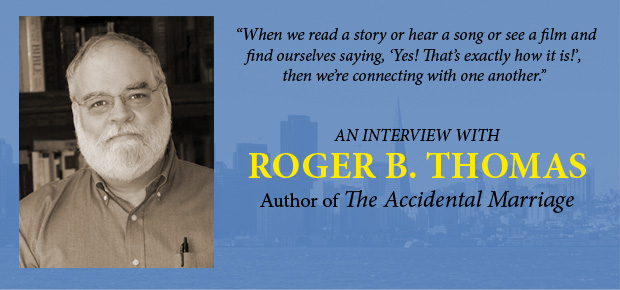Roger Thomas is a lifelong Michigan resident, has been married to his wife Ellen since 1981. They have six grown children and eight grandchildren. He is a self-employed computer consultant. He loves reading, and his favorite authors include C.S. Lewis, J.R.R. Tolkien, Rudyard Kipling, and P.G. Wodehouse. He has had two collections of short stories published by Ignatius Press, including The Last Ugly Person which was recently featured in a list of 5 More Short Stories That Every Catholic Should Read. Ignatius Press Novels interviewed Roger via email regarding his new novel The Accidental Marriage.
Where did the idea for this book come from?
Thomas: Oddly, it was a chance line in an online article. It was written by a woman who considers herself a lesbian, and discussed the costs and challenges of getting pregnant. She made an offhand comment that one last resort option is always to just call up a guy friend for an informal “contribution” to facilitate the pregnancy. I pondered that comment, and that it reflected a very shallow understanding of the intricacy and intimacy of what happens when two people join to bring a child into being. I began imagining what kind of complexities might follow such an interaction, and before long the characters of Scott and Megan were coming to life.
Recently, Archbishop Cordileone of San Francisco made this appeal to people critical of the Church’s position on same-sex marriage: “Please do not make judgments based on stereotypes, media images and comments taken out of context. Rather, get to know us first as fellow human beings… It is the personal encounter that changes the vision of the other and softens the heart.” During the course of the book, Scott and Megan find that their stereotypes and expectations about others are challenged, both in positive and negative ways. Do you hope your book can help draw out that “encounter” between people with divergent opinions?
Thomas: I certainly hope so. Archbishop Cordileone’s statements cut two ways, as he and other church leaders have made clear. We, especially as Catholics, must not judge on stereotypes and media images, but get to know one another personally.
A drawback of our current cultural dialog, fraught as it is with friction and antagonism, is that was start defining ourselves by our differences. I’m male, she’s female; I’m white, he’s black; I’m a veteran, she’s never served, and so on. This has an isolating effect which you can see expressed in statements like, “You couldn’t possibly understand, because you’re not X”, whatever X might be. Pressed to the extreme, this increasingly isolates us from one another, because nobody is ever going to completely share another’s personal conditions and life experience.
As St. John Paul the Great frequently reminded us, one of the roles of the arts is to reach across those walls and reconnect us with each other in our common humanity. When we read a story or hear a song or see a film and find ourselves saying, “Yes! That’s exactly how it is!”, then we’re connecting with one another. And even as Scott and Megan find their categories getting broadened by their life experiences, I hope the readers of The Accidental Marriage come to see the main protagonists for what they are: simply humans, fellow humans searching for love. Easy as it would be to pigeonhole them as a couple of Bay Area gays living out their mistaken world views, I hope the story brings out their essential humanity in a way that resonates with every reader.
It often seems that the business world of tech startups—the way that there is constant agitation for change and growth without much regard for how that change and growth affects the real people involved—is reflective of a view of relationships that values novelty and change over permanence and depth. Was the setting of the book intentional in this regard?
Thomas: Actually, that was unintentional, but it’s interesting to look back on the story and see that correspondence. There is a disturbing similarity between the interchangeable-persons outlook of the modern corporate world and the similar view of “relationships” – of any type – that is common in our culture. Both reflect a short-term, immediate-return outlook. If this employee (or investment, or partner) isn’t “performing”, then it’s time to change it out.
Love is normally portrayed in romantic fiction as a form of self-fulfillment. Do you think our culture’s emphasis on “romance” helps or hinders love?
Thomas: I think it’s a serious impediment to deep and lasting love. I call it “The Myth of the Everything Relationship” – this idea that one other person can fulfill or complete you. Approaching a relationship like that puts an unbelievable amount of pressure on the other party and the very fabric of the relationship. I obliquely address this in the book, but I don’t want to spell out where, lest I spoil any surprises.
What advice would you give to people struggling with same sex attraction?
Thomas: First, it’s not an “identity” or an “orientation”. It’s part of the struggle of existence. I’ve been happily married for 33 years now, but at times women other than my wife have caught my eye. Does that make me “poly”? Does that have some mystical implication for my marriage? No, and no – it just means I’m a human struggling in my fallen state.
Some of the most insightful writing on this topic has been done by a minister named Leanne Payne. All her works are great, but I’d particularly recommend The Broken Image as a book to help understand and deal with SSA.
Who is your favorite character in The Accidental Marriage? And why?
Thomas: That would be Helge Sykes of Big Springs. Other authors will know what I mean when I say that she was a character who just showed up and took over. When I was plotting out the story, I knew something was going to happen to Scott and Megan on their way back home to Michigan. When I was looking at a map and filling in details in my mind, this dusty green minivan pulled up and this rough-cut Nebraska housewife came stomping out. From there, she pretty much took over that section of the story. In my opinion, she’s the most three-dimensional, true-to-life character in the book (though I hope all of them are.)
Who are some of your favorite novelists?
Thomas: I practically grew up on C.S. Lewis’ Narnia Chronicles, but also love Tolkien, Kipling, J.K. Rowling, and C.J. Cherryh. My wife and I have just picked up an author who’s new to us – Lois McMaster Bujold – and we are liking her works.
What other things have you written?
Thomas: Over 20 years ago Ignatius Press published my only work to yet make it to print: The Last Ugly Person, a collection of stories. They also picked up another collection I wrote, called The Ghosts of Midgard Manor, but they haven’t yet published that. I once wrote a novel for my children, a Narnia-like tale called The Crown Jewels of Undlar, but that’s never been published. Neither has the sequel to Numaris, which was a story in Last Ugly. Someday I may pick that up again, but it’ll need a lot of cleaning up before I take it anywhere.
Do you have any advice for Catholic authors?
Thomas: Read good literature. Immerse yourself in it, because that will give you a sense of what good writing looks like. Be prepared to write and discard thousands of words. Write a story and tuck it away for six months, then pull it out and see how it reads. Early on, you’re going to find yourself wrinkling your nose at what you put on paper, but the more you do it (while immersing yourself in good writing), the better you’ll get. I wrote reams of garbage in my early years, and ultimately threw most of it away. Eventually my skills started getting better (not that I’m a memorable author yet.)
Are you working on anything new?
Thomas: I have two manuscripts in for consideration at Ignatius right now, and will shortly begin plotting another one. I don’t want to go on about those, because no decision has yet been made on them.







T. M. Doran
September 8, 2014 at 5:16 pm
I had the pleasure of reading an early draft of “The Accidental Marriage” and thoroughly enjoyed it. The story provoked thought, as well as being a good read. Roger Thomas is a writer who isn’t afraid to go deeper, to challenge conventional thinking.